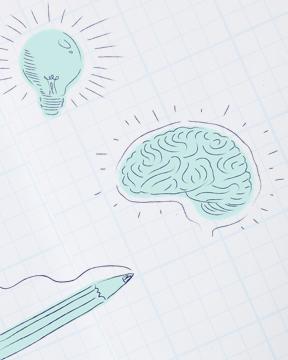Why Creativity Is More Important than Ever

At IDEO, we know that our greatest tool for innovation and problem solving is creativity. But from the time we’re children, we’re taught that creativity is only for some people, or that it’s something you lose as you grow older. It’s considered fanciful, rather than intrinsic to good design, and even business. To us, it’s the most important part of what we do, and helps us open our minds to discovering new solutions to tough problems.
We asked a few trailblazing creative leaders inside and outside of IDEO to explain why creativity matters — in their work, and in the world.
“Creativity has this amazing power to give you renewed enthusiasm and energy—even in the most difficult circumstances.”
Warren Berger
Creativity is at the core of being human

Jane Fulton Suri
IDEO Partner Emeritus and Executive Design Director
I’ve always believed that creativity is at the core of being human. I don’t think there’s ever been a time when it hasn’t been important, but it may be more acceptable now. Because one of the problems with creative people is they upset the status quo. Creativity is about making change. By its nature, even when it’s directed to improving things, creativity tends to be disruptive or subversive, unless it’s accepted in a space as the norm. Maybe society is moving toward creativity being recognized as a more significant advantage of being human. There seems to be a lot more excitement around it. We’ve had some serious times in history where creativity has been frowned upon. Certain groups of people have been allowed to be creative, but it’s been stomped out quite a lot through human history. We’re reclaiming our heritage. It’s an exciting time.
Creativity is a competitive tool

Warren Berger
Author of A More Beautiful Question
From a competitive standpoint and a business success or career success standpoint, it's one of the most important tools you can have. It's the way you can distinguish yourself and the way you can innovate. Now, more than ever, creativity is the competitive tool that’s going to make a difference. Whether you're an entrepreneur, a large company, or a solo creative person, it's what makes you stand out.
In today's world, we're all under a lot of pressure. We're all dealing with a lot of demands, and the thing that energizes us and keeps us going strong is creativity. Creativity has this amazing power to give you renewed enthusiasm and energy—even in the most difficult circumstances. It works on two different levels. One is purely the fact that it’s a competitive tool that can help you succeed; the other is that it's going to energize you. It's going to make you feel better. It's going to make you feel like you want to push forward even when times are tough.
Creativity links the head and heart

Jenn Maer
IDEO Design Director
Creativity makes the world a better, more beautiful, more friendly place. When you think creatively, you’re opening your heart and mind and you're relating to people as humans. Creativity is an incredibly human thing. When we get too stuck in our heads we wind up acting in ways that can be harmful. You need to balance that head and heart, and creativity is the link between the two.
“With creativity, we stop relying on what’s always been and open our eyes to what might be.”
Matt Adams
Emerging technology and creativity are interconnected

Matt Weiss
IDEO CoLab Managing Director
A wave of emerging technologies that could change society is heading our way. We've been selective about our portfolio technologies, choosing technologies that will change the way markets work. They’re going to change the way the industries we're looking at—and those beyond—are going to function.
Applying creative muscle to new technologies while they’re still being shaped is an amazing opportunity. I believe it will help those technologies understand human needs faster. It will help orient this massive wave of technology that's coming. There's a challenge for the creative world to be technically centered—to be paying attention to emerging technology.
Venture design requires a creative approach

Katherine Londergan
IDEO Portfolio Director and Business Designer
Our most exciting work, in my opinion, is when we're creating the new “new.” You can't hold onto a core business and strangle it. You can only optimize what’s known and hold onto what’s expected for so long; to truly depart from what's known and comfortable takes creativity. When you’re trying to spin up entirely new value propositions, entirely new businesses, you need a more generative approach. You need different inputs and methods to inspire that process. You need to start from what could be, or else you're just doing incremental innovation on existing products and with existing customers—which isn't venture design.
Democratized learning opened the door to creation

Tyler Florence
Chef and Food Network Television Host
It's a phenomenal time to be able to express yourself. It's a world open to every person who didn't get a pilot picked up, or wouldn't necessarily know how to contact the Food Network, or wouldn't know how to put together a cookbook deal, or was turned down because they didn't have that “it” factor, or they're not pretty enough, whatever it is. Now, all content plays.
If you are creative, or if you're slightly creative, or if you see something really wonderful and beautiful, just shoot it. Just shoot it and put it up. The more you shoot it, the more you play around with editing software, the more you can create great stuff—the more fulfilling it will be.
Technology has become so readily available and easy to get your hands on, and it’s so easy to sculpt and shoot great stuff and post and produce it. It's opening up the floodgates to a world that you've never seen before. It's super exciting.
Everything there is to learn in the world is available on YouTube. You can look up how to change a spark plug in a 1957 Cutlass Ciera—there's a video for that. This is the new world of online institutional education, democratizing people’s skills and sharing them with people who want to learn something as fast as possible.
To answer your question about creativity, I think it's a whole, brand new, open world of sharing.
“When you think creatively, you’re opening your heart and mind and you're relating to people as humans.”
Jenn Maer
Our relevancy depends on creative capability

Neil Stevenson
IDEO Executive Portfolio Director
There’s a huge gap around creativity. Everybody’s talking about it and saying they want it, and yet it seems to be poorly understood. When people try to define it, they really struggle; it actually turns out to be a whole bundle of different processes under one banner. It’s one of those things where there’s a gap between the desire for creativity and the understanding of it, which is an interesting opportunity.
Within society and organizations there’s this rising tide of people saying, “I need to be creative, because the robots and AIs are coming and all the boring jobs will be done by computers.” It’s like the flood is coming and the high ground is going to be creative work, because it’s harder to automate. Creativity is a way we can add value and do well as people, while staying relevant and not being replaced by computers.
Innovative solutions rise from creative thought

Claudia Kotchka
Innovation and Strategy Advisor and IDEO Fellow
I believe David Kelley’s premise that everyone is creative—that they start that way, and school beats it out of them. By the time you get into the corporate environment, you’ve lost a lot of belief in your own creativity. But you can’t solve the world’s problems if you’re not willing to be creative and look at things differently.
One of the key limitations of creativity is asking the wrong question. There’s this quote from a designer, “Don’t ask me to build a bridge; show me the canyon,” that reflects this limitation. Maybe a bridge isn’t the answer. If you want to get from side A to side B and you ask me to build a bridge, you’ve already given me the answer. When in fact, the best answer may not be to build a bridge, it might be to take a boat or a zip line from A to B.
When you start a creative project, you start by broadening the questions to leave more solutions open. So one of the first steps in creative problem solving is, don’t put the solution in the question. The next one is to be open to different ideas and ways of doing things. Test things you know you’re never going to do.
When Frank Gehry designs buildings, he'll show a prototype to the client and get comments. But when he returns he’ll show something completely different, something that wasn’t even close to the first prototype. He does this because he is testing boundaries.
Today’s challenges require a creative approach

Matt Adams
IDEO Portfolio Director
The world needs creativity because problems aren’t getting simpler. With creativity, we stop relying on what’s always been and open our eyes to what might be. As problems get more complex, there are fewer examples of how to solve them. Instead of looking at what is or what has been, we need to start looking to what can be.
I mean, it’s crazy to think about the L.A. County Clerk and Registrar Recorder. These guys do elections, marriage certificates, new businesses, and they’re doing deeply human human-centered work for voting systems. If they can do it, what’s everybody else’s excuse?
Learn how to exercise your creative muscle with activities and lessons focused on overcoming common barriers in our on-demand online class Unlocking Creativity.
- choosing a selection results in a full page refresh
- press the space key then arrow keys to make a selection



